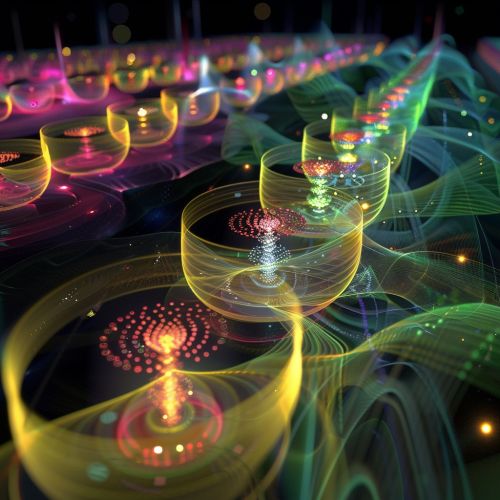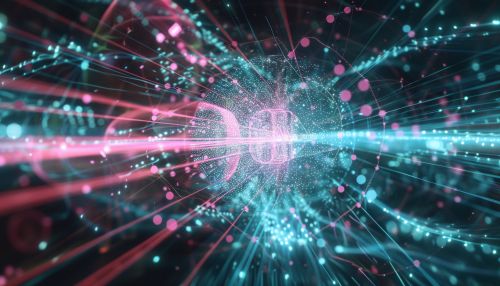Quantum Automaton: Difference between revisions
(Created page with "== Quantum Automaton == A quantum automaton is a theoretical model of computation that extends the classical concept of an automaton to the quantum domain. This model leverages principles from quantum mechanics to perform computations, providing unique capabilities and efficiencies that classical automata cannot achieve. Quantum automata are a fundamental component in the study of quantum computing, which explores how quantum systems can be harnessed for computa...") |
No edit summary |
||
| Line 3: | Line 3: | ||
A quantum automaton is a theoretical model of computation that extends the classical concept of an automaton to the quantum domain. This model leverages principles from [[quantum mechanics]] to perform computations, providing unique capabilities and efficiencies that classical automata cannot achieve. Quantum automata are a fundamental component in the study of [[quantum computing]], which explores how quantum systems can be harnessed for computational purposes. | A quantum automaton is a theoretical model of computation that extends the classical concept of an automaton to the quantum domain. This model leverages principles from [[quantum mechanics]] to perform computations, providing unique capabilities and efficiencies that classical automata cannot achieve. Quantum automata are a fundamental component in the study of [[quantum computing]], which explores how quantum systems can be harnessed for computational purposes. | ||
[[Image:Detail-92533.jpg|thumb|center|A visualization of a quantum automaton, showing quantum states and transitions.|class=only_on_mobile]] | |||
[[Image:Detail-92534.jpg|thumb|center|A visualization of a quantum automaton, showing quantum states and transitions.|class=only_on_desktop]] | |||
=== Historical Background === | === Historical Background === | ||
Latest revision as of 05:10, 15 June 2024
Quantum Automaton
A quantum automaton is a theoretical model of computation that extends the classical concept of an automaton to the quantum domain. This model leverages principles from quantum mechanics to perform computations, providing unique capabilities and efficiencies that classical automata cannot achieve. Quantum automata are a fundamental component in the study of quantum computing, which explores how quantum systems can be harnessed for computational purposes.


Historical Background
The concept of quantum automata was first introduced in the late 20th century as researchers sought to understand the computational power of quantum systems. Early work by Richard Feynman and David Deutsch laid the groundwork for quantum computation, and the notion of quantum automata emerged as a natural extension of these ideas. Quantum automata were formally defined in the context of quantum finite automata (QFA) and quantum Turing machines (QTM), which are quantum analogs of classical finite automata and Turing machines, respectively.
Quantum Finite Automata (QFA)
Quantum finite automata are the simplest type of quantum automaton. They consist of a finite set of quantum states, a set of input symbols, and a transition function that determines the probability amplitudes for state transitions based on the input symbols. There are two primary models of QFA: measure-once QFA (MO-QFA) and measure-many QFA (MM-QFA).
Measure-Once QFA (MO-QFA)
In MO-QFA, the quantum state is measured only once at the end of the computation. The result of the measurement determines the acceptance or rejection of the input string. This model is simpler to analyze but has limited computational power compared to its classical counterpart.
Measure-Many QFA (MM-QFA)
In MM-QFA, the quantum state can be measured multiple times during the computation. This allows for more complex behavior and greater computational power. MM-QFA can recognize a broader class of languages than MO-QFA, including some that are not recognizable by any classical finite automaton.
Quantum Turing Machines (QTM)
Quantum Turing machines are a more powerful model of quantum automata, analogous to classical Turing machines. A QTM consists of an infinite tape, a finite set of quantum states, a tape head that reads and writes symbols on the tape, and a transition function that determines the probability amplitudes for state transitions based on the current state and the symbol under the tape head.
QTMs are capable of performing any computation that a classical Turing machine can, but they can also exploit quantum parallelism to solve certain problems more efficiently. For example, Shor's algorithm for integer factorization and Grover's algorithm for unstructured search are both implemented on QTMs and provide exponential and quadratic speedups, respectively, over the best-known classical algorithms.
Quantum Automata and Language Recognition
One of the primary applications of quantum automata is in language recognition. Quantum automata can recognize certain types of formal languages more efficiently than classical automata. For instance, QFA can recognize some non-regular languages with fewer states than any equivalent classical finite automaton. This has significant implications for the theory of computation and the design of efficient algorithms.
Quantum Automata and Complexity Theory
Quantum automata also play a crucial role in complexity theory, particularly in understanding the relationships between different complexity classes. The class of problems solvable by quantum polynomial-time algorithms (BQP) is a central focus of this research. Quantum automata provide insights into the boundaries of BQP and its relationship with classical complexity classes such as P and NP.
Practical Implementations and Challenges
While quantum automata are primarily theoretical constructs, there have been efforts to implement them on physical quantum computers. These implementations face several challenges, including quantum decoherence, error correction, and the need for precise control over quantum states. Despite these challenges, progress in quantum hardware and quantum error correction techniques continues to bring practical quantum automata closer to reality.
Future Directions
The study of quantum automata is an active area of research with many open questions. Future work may explore new models of quantum automata, their computational power, and their practical applications. Advances in quantum hardware and algorithms will likely drive further developments in this field, potentially leading to new breakthroughs in quantum computing and information processing.
